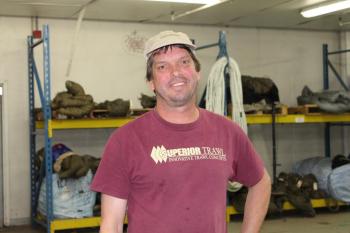Jon Knight

Sector Management in New England
This project documents fishery management related changes in individuals, households, and communities in New England.
Caitlyn Lawrence
Jon Knight, 52, is the owner of Superior Trawl, a fishing gear designer and builder, in Galilee/Point Judith, Rhode Island. He began as a commercial fisherman and was drawn to working with nets. He began working for various gear shops and attended the University of Rhode Island, receiving both a technical degree in fisheries and later a bachelor's degree in mechanical engineering. He owns and operates Superior Trawl and is involved in cooperative research, in an effort to improve selectivity in fisheries. He believes that sectors would have worked better under Days at Sea than they do under quotas, and that the allocation process was greatly flawed. Mr. Knight believes that one of the greatest struggles right now is proper, smart management of the stock that is present. He believes there is a large amount of fish out there, but that management policies do not reflect the increase in biomass. When sectors began, there was a noticeable impact on the health of fishermen and relationships in the port; he too experienced anxiety when sectors began, but has not experienced a change in his business. Mr. Knight views fishermen as constant innovators and has seen regulations alter the nature of innovation in fisheries.
Please Note: The oral histories in this collection are protected by copyright and have been created for educational, research and personal use as described by the Fair Use Doctrine in the U.S. Copyright law. Please reach out Voices@noaa.gov to let us know how these interviews are being used in your research, project, exhibit, etc. The Voices staff can help provide other useful resources related to your inquiry.
The NOAA mission is to understand and predict changes in climate, weather, oceans, and coasts, to share that knowledge and information with others, and to conserve and manage coastal and marine ecosystems and resources. The Voices Oral History Archives offers public access to a wide range of accounts, including historical materials that are products of their particular times, and may contain offensive language or negative stereotypes.
Voices Oral History Archives does not verify the accuracy of materials submitted to us. The opinions expressed in the interviews are those of the interviewee only. The interviews here have been made available to the public only after the interviewer has confirmed that they have obtained consent.
